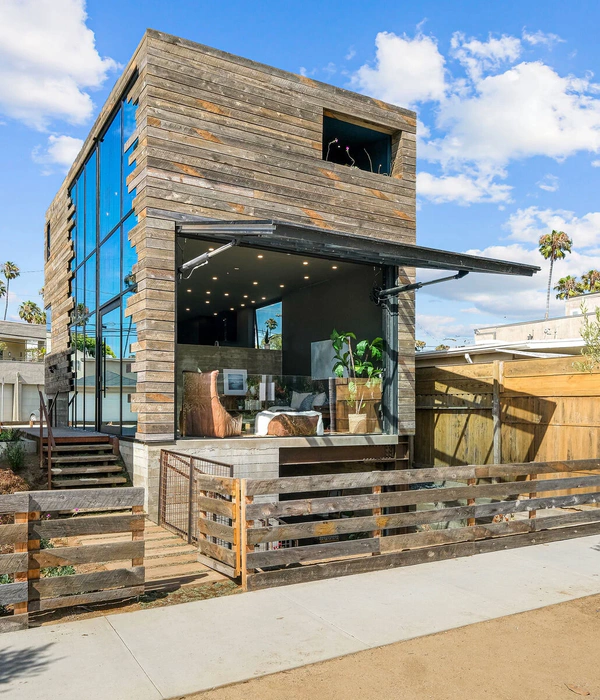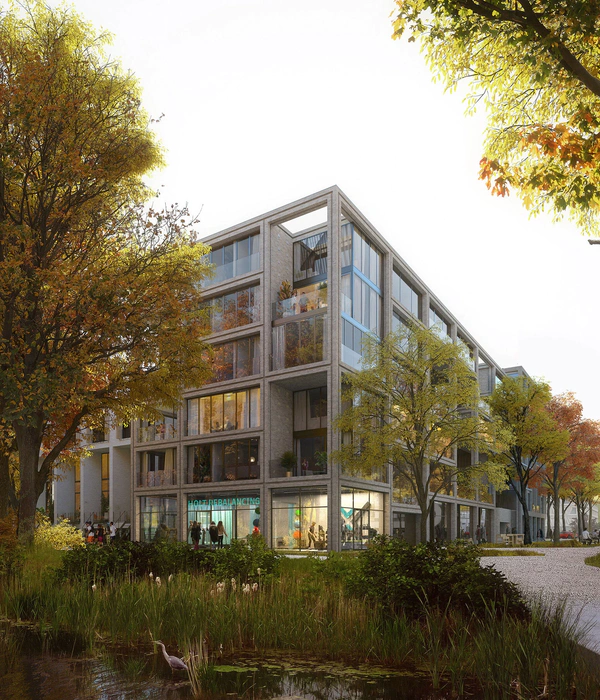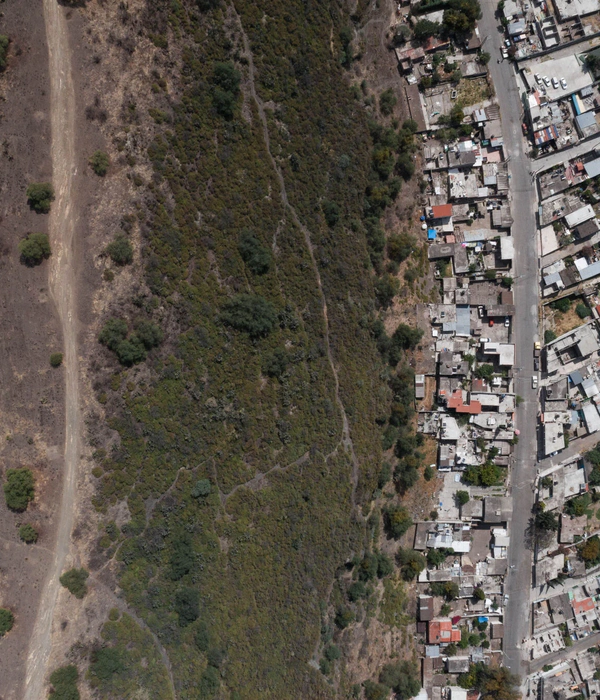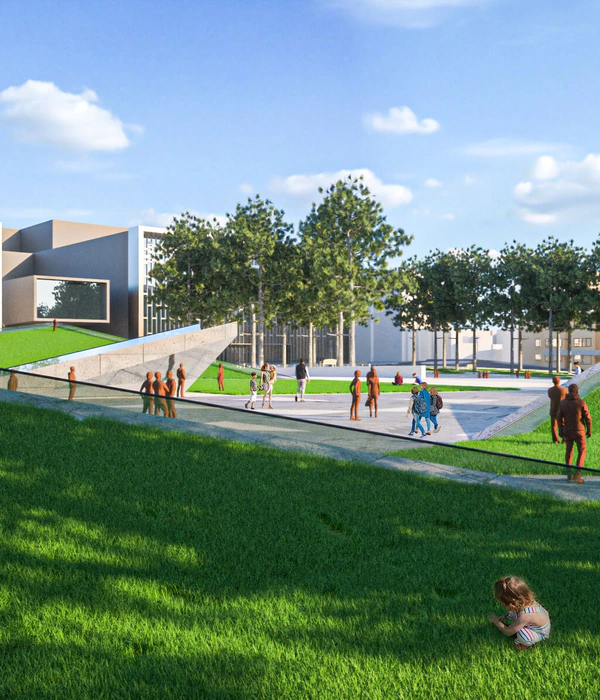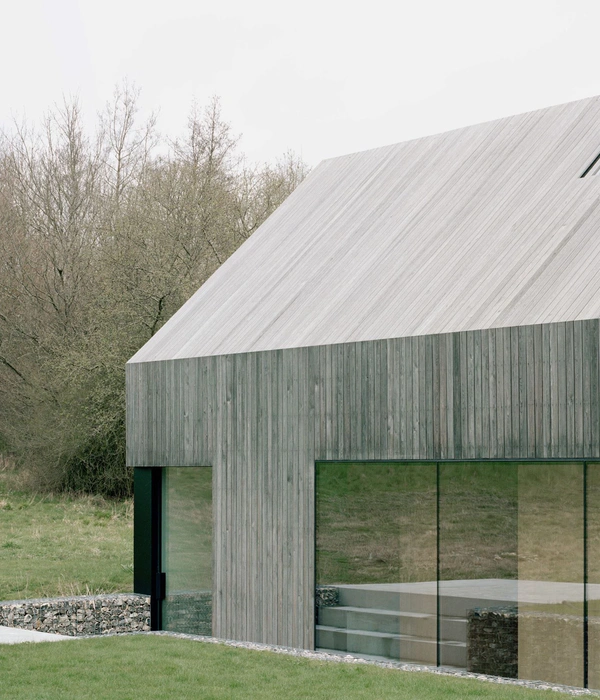- 项目名称:哈尔滨深哈中心
- 项目地点:黑龙江省哈尔滨市松北新区
- 施工单位:深圳时代装饰股份有限公司,长春森茂园林景观工程有限公司
- 设计团队:王铮健,李振,姚迪,宋冰茜,于辉,尤海霞,马宁悦,张雷
- 建筑公司:深圳市库博建筑设计事务所有限公司
- 室内设计:矩阵纵横设计股份有限公司
- 摄影师:栾祺,河狸景观摄影
整体项目背景地处哈尔滨松北新区,为深入实施国家区域协调发展和东北振兴战略,进一步深化两地对口合作,深圳跨越 2800 公里与哈尔滨携手共建深圳(哈尔滨)产业园区,探索“飞地经济”模式,塑造南北合作典范,推动东北全面振兴、全方位振兴。《哈尔滨“特区”、深圳“飞地”》正式落户哈尔滨新区西部。项目便是借此成为整体区域规划开发先行部分,展现以商业,商场及住宅为一体化的综合性开发模式。
The overall project background is located in Harbin Songbei New District. In order to further implement the national and regional coordinated development and northeast revitalization strategy, further deepen the counterpart cooperation between the two places. Shenzhen spans 2,800 kilometers joins hands with Harbin to build the Shenzhen (Harbin) Industrial Park, explore the “enclave economy” model, shape a model of North-South cooperation, and promote the comprehensive and all-round revitalization of the Northeast. “Harbin “Special Zone” and Shenzhen “Enclave”” officially settled in the west of Harbin New District. The project is to become the first part of the overall regional planning and development, showing a comprehensive development model integrating commerce, shopping malls and residential buildings.
▼区位分析 District Analysis
作为风景园林或者景观,我们在设计前期针对建筑及开发周期,销售产品进行整体分析后,通过可控的开发周期,提供总结了切入项目的三种经验或者视角,可以希望更好的对场地及适用人群带来有效的服务和城市整体性的塑造。
▼24H 人群活动分析图 24H crowd activity analysis chart
此外,在项目完成后的一段时间内,设计师一直在思考景观之于场地的价值与意义,便也借此思考可以更大的扩充景观的媒介与现实功用,相比建筑的实效性,景观应该更多的在功能之外创造发掘场所的艺术维度,唤醒并强化场地的艺术弹性和承载功效,更多的情感链接与丰富性,形成与人更细腻的,潜在的对话。
In addition, for a period of time after the completion of the project, the designer has been thinking about the value and significance of the site. It can also expand the media and practical function of landscape. Compared with the effectiveness of architecture, the landscape should create more artistic sense of the place beyond the function, awaken and strengthen the artistic elasticity and bearing effect of the place, more emotional links and richness, and form a more delicate and potential dialogue with people.
▼概念落位分析 Concept position analysis
城市经验/离散动线| Urban experience / evacuation route
城市景观从不同的角度思考,有很多的维度,城市景观作为事件的容器更大程度上是承载并且带来持续的可能性,城市景观更多的倡导链接与混合,在这样一种背景下,使用人群才会产生多样的活动行为与潜在的场景激发,另外一种城市景观在主体之下要更多的以人文视角对大体量的建筑主体与以消融和化解,缓释体量带来的压迫感,毕竟除了宗教建筑大部分功能的建筑环境还是更多的需要日常的回归,这也侧面的说明了,国内国际的优秀的超高层单体或大体量建筑,下部场地更多的以温暖闲适的花园空间作为承载。
Urban landscape has many dimensions from different perspectives. As the container of events, urban landscape carries and brings the possibility of sustainability to a greater extent. Urban landscape advocates more links and mixing. In such a context, users will produce a variety of activity behaviors and potential scene stimulation. In addition, under the main body, the urban landscape should melt and dissolve the large-scale building main body from the humanistic perspective, so as to slow down the sense of oppression brought by the volume. In addition to religious architecture, most functional architectural environments still need daily return. This also shows the excellent super high-rise single or large-scale buildings at home and abroad, and the lower site is more carried by warm and comfortable garden space.
▼项目鸟瞰 Project bird’s eye view
本项目恰恰属于在第二个可能背景下实现城市与建筑柔和的介入,建筑在介于城市转角的方位下通过切割和拉伸形成了东西向最大的面宽立面以此来完成针对城市及项目展现的野心与形象,巨幕的玻璃立面塑造通透感,强有力的形态边线和金属板的应用展现了大尺度的刚性和雕塑感。前场进退与城市的基底预留出 40*100 米的超大场地,景观设计一分为二的后退 20 米作为城市的过度空间,承接由停车场,城市南侧及转角进入的人群,剩下 20 米的进深巧妙的把 600 的室内外高差给予放大和夸张,使竖向和台阶有效地进行了场景合并,并且通过台阶作为主体形成了通向东西的节奏变化,西侧通过丰富的绿化结构为建筑和城市带来空间和视觉的收合,东侧由于处在车流人流最密集的视觉区域,景观有效的延伸并且提升了建筑下部近人空间的感召力,在边界的处理上植入企业昭示景观体系并尽量处理的高级与轻盈,与城市东侧步行道路形成关照与体验,不争不抢的创造连接城市的场域,这类似于母体中的经验印记,本能又充满不确定性的感受。
The project realizes the integration of city and architecture under the possible background. The building forms the largest East-West wide facade through cutting and stretching at the corner of the city, so as to complete the ambition and image of the city and the project. The glass facade of the giant screen creates a sense of permeability, and the application of powerful shape sidelines and metal plates shows the sense of large-scale rigidity and sculpture. A super large site of 40 * 100m is reserved for the advance and retreat of the front court and the base of the city. The landscape design is divided into two parts and retreated for 20 meters as the transitional space of the city to undertake the people entering from the Parking lot, the south side of the city and the corner. The remaining depth of 20 meters skillfully magnifies and exaggerates the indoor and outdoor height difference of 600. The vertical and steps are combined effectively. And through the steps as the main body, the rhythm change leading to the East and the west is formed. The west side brings space and visual integration for buildings and cities through rich greening structures. Because the east side is located in the visual area with the most dense traffic and people flow, the landscape effectively extends and improves the entrance water feature.
▼形象界面过渡水景 Image interface transition waterscape
▼字母景观标识 Letter landscape logo
步入建筑室内后绕过展台,是打开的客户休憩区,在玻璃幕墙立面的关系下,我们最大化的把视线推到北侧红线边界处,预留出经过室内的延展动线,把视线扩充到远处边界形成内与外的大空间的体验感受,同时预留出可供活动的后场空间,有效地延续了室内的功能,创造出内外共融合的功能状态,同时在步行动线上,以隐藏的方式最小化的干预环境,并能形成道路闭环,使整个室内的视距可以无限延展。构成“向外看“的完整的场地空间。
After entering the building, it bypasses the booth, which is the open customer rest area. Under the relationship of glass curtain wall facade, we maximize the line of sight to the boundary of the red line on the north side, reserve the extended moving line passing through the interior, expand the line of sight to the distant boundary, and form the experience of large space inside and outside. At the same time, a backcourt space for activities is reserved, which effectively continues the indoor function. Create a functional state of internal and external integration. At the same time, on the walking line, the intervention environment is minimized in a hidden way, and a road closed loop is formed. The sight distance of the whole room can be extended infinitely. Form a complete site space of “looking out”.
▼阳光草坪及会客厅鸟瞰图 Aerial view of Sunshine Lawn and Meeting Room
▼阳光草坪会客厅 Sunshine Lawn Meeting Room
3.场所经验/唯一动线 | Site experience / unique moving line
此外本次项目后场的设计上对北方的格局通过形态和尺度也进行了整体的回应,通过“回“形嵌套的空间布局,从建筑到内庭进行了围绕交通的布局,同时打开彼此之间的界面形成富有韵味的框景和借景的园林体系,完成对场景的描摹及对身体的包裹。
▼林荫四季庭院 Tree-lined Four Seasons Courtyard
▼四季庭院鸟瞰 A bird’s eye view of the Four Seasons Courtyard
▼四季庭院局部鸟瞰 A partial bird’s eye view of the Four Seasons Courtyard
四季庭院主轴水景 Four Seasons Courtyard Spindle Waterscape
四季庭院夜景 Four Seasons Courtyard Night View
四季庭院围廊 Four Seasons Courtyard Porch
四季庭院围廊及灯光细部 Four seasons courtyard corridor and lighting details
现代主义设计其实作者理解是一种基于哲学的取舍之道,从古典主义的寻找本我,到文艺复兴的主观释意到当下的随性与坦然,是在遵循一种生命的规律,使事物的物性和精神得到更自然的表达和回归,是一种尊重客观事实而选择接受的一种开放态度,打破了禁锢后的一种状态,轻松而愉悦便是我们内心的一种观照。
四季庭院围廊细部 Four seasons courtyard perimeter detail
四季庭院围廊及灯光细部 Four seasons courtyard corridor and lighting details
▼入口门庭 Entrance gate
▼入口门庭 Entrance gate
项目名称:哈尔滨深哈中心 Harbin ShenHa Center
完成年份:2020
景观面积:33000㎡
项目地点:黑龙江省哈尔滨市松北新区
设计公司:里表都会(北京)规划设计咨询有限公司
业主单位:华御兴益(哈尔滨)房地产开发有限公司
施工单位:深圳时代装饰股份有限公司、长春森茂园林景观工程有限公司
主设计师:王铮健、李振、姚迪
设计团队:宋冰茜,于辉,尤海霞,马宁悦,张雷
建筑公司:深圳市库博建筑设计事务所有限公司
室内设计:矩阵纵横设计股份有限公司
摄影师:栾祺 /河狸景观摄影
Project Name: Harbin ShenHa Center
Year of completion: 2020
Landscape area: 33000㎡
Project location: Songbei New District, Harbin City, Heilongjiang Province
Design company: Unlimited Metropolis Design Studio
Owner: Huayu Xingyi (Harbin) Real Estate Development Co., Ltd.
Construction unit: Shenzhen Times Decoration Co., Ltd., Changchun Senmao Landscape Engineering Co., Ltd.
Lead designers: Wang Zhengjian, Li Zhen, Yao Di
Design team: Song Bingqian, Yu Hui, You Haixia, Ma Ningyue, Zhang Lei
Construction company: Shenzhen Cooper Architectural Design Office Co., Ltd.
Interior Design: Matrix Design Co., Ltd.
Photographer: Luan Qi/Holi Landscape photography
"从古典主义中寻找本我,遵循生命的规律,轻松而愉悦便是我们内心的一种观照。"
审稿编辑:王琪 -Maggie
{{item.text_origin}}


